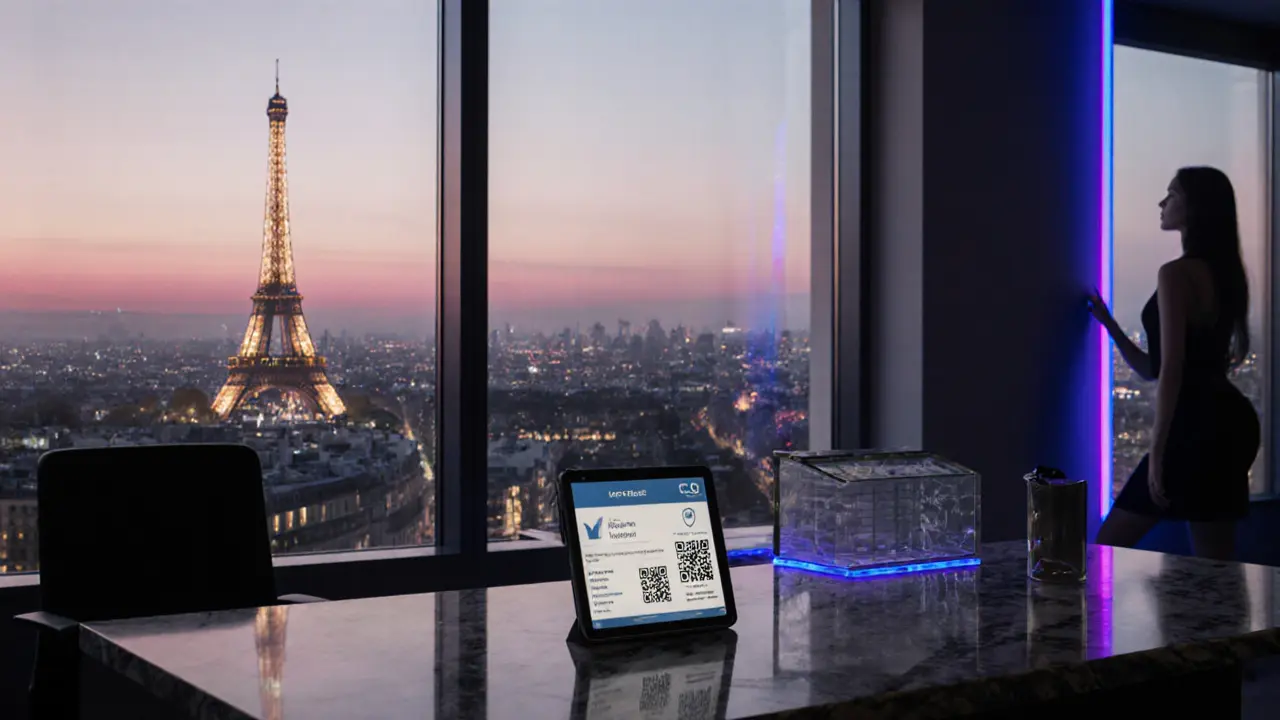Future of Paris Escort Industry: Trends & Predictions

Everyone’s asking where the Paris escort industry is headed. With new tech, shifting laws, and changing client attitudes, the landscape is morphing faster than a runway show. This article breaks down the biggest forces reshaping the market and gives you concrete ideas on what to watch for in the next few years.
Key Takeaways
- French lawmakers are drafting tighter licensing rules that could standardize safety and pricing.
- Online platforms powered by AI are cutting booking friction and personalizing client matches.
- Blockchain is emerging as a trust‑building tool for identity verification and payment transparency.
- Virtual‑reality (VR) companionship is moving from novelty to a revenue stream for high‑end agencies.
- Clients are demanding clearer safety standards, transparent pricing, and discreet digital experiences.
Current State of the Paris escort industry a multi‑billion‑euro market that blends traditional agency models with a growing number of online services, operating under a mix of informal agreements and limited French regulations
In 2024, roughly 1,200 registered agencies operated in the city, serving an estimated 30,000 clients annually. Most bookings still happen through phone calls or private messaging, but a solid 35% of new clients now start on a digital platform. Revenue per hour averages €250, but elite companions earn upwards of €1,200 in high‑demand districts such as the 1st and 8th arrondissements.
Regulatory Landscape: Upcoming Changes in France
Paris’ municipal council launched a draft decree in early 2025 that would require all escort service providers to obtain a “professional escort licence”. The licence would mandate background checks, mandatory health screenings every six months, and a minimum wage floor for independent escorts. While the draft still faces industry push‑back, the trend signals a shift from the current semi‑underground status toward a more formalised sector.
Key points of the proposal:
- Mandatory registration of agencies and independent workers with the city’s Bureau of Public Morality.
- Standardised safety protocols, including verified emergency contacts and GPS‑enabled check‑ins.
- Transparent pricing guidelines to curb price‑gouging.
- Heavy penalties for non‑compliance, ranging from fines to temporary shutdowns.
Operators who adapt early will gain a competitive edge by marketing themselves as “licensed and safe”. Those who ignore the direction risk legal action or loss of client trust.
Digital Transformation: Platforms, AI, and Blockchain
Online platforms have already cut the average booking time from days to minutes. The next wave will be driven by Artificial Intelligence matchmaking algorithms that analyse client preferences, conversation tone, and historical ratings to suggest the most compatible companion. Early adopters report a 20% increase in repeat bookings.
Blockchain is entering the scene as a way to verify identities without exposing personal data. A decentralized ledger can store encrypted health certificates and background checks, allowing clients to see a “verified” badge on a profile while keeping the underlying documents private. This technology also enables instant, traceable payments that bypass traditional banking fees, which is especially appealing for cross‑border clients.
Combined, AI and blockchain create a “trust stack” that addresses two of the biggest pain points: finding the right match quickly and feeling safe about the companion’s legitimacy.

Emerging Tech‑Enhanced Services: VR and AR Companionship
Virtual Reality is moving from adult‑film gimmicks to genuine companionship experiences. High‑end agencies are launching VR lounges where clients can interact with holographic representations of escorts, complete with voice‑modulated conversation and realistic gestures. The technology isn’t replacing physical meetings yet, but it serves as a low‑cost entry point for newcomers and a supplementary revenue line for existing agencies.
Augmented Reality (AR) is also being explored for “remote date” experiences. By overlaying a 3‑D avatar onto a client’s real‑world environment, agencies can offer a more immersive, personalized service that feels less like a video call and more like an in‑person encounter.
Pricing for VR sessions currently ranges from €80 for a 30‑minute experience to €250 for a full‑hour custom scenario. As hardware becomes cheaper, we expect broader adoption and competitive pricing.
Shifts in Client Preferences and Pricing Trends
Clients are no longer satisfied with a one‑size‑fits‑all approach. Data from the leading Parisian platform “ÉtoileConnect” (2025 Q2) shows:
- 45% of users now request “safety‑verified” profiles.
- 30% prioritize “environmentally sustainable” agencies that use digital contracts instead of paper.
- 25% are willing to pay a premium for AI‑curated matches that promise higher compatibility.
These preferences are nudging the market toward transparent pricing structures. Flat‑rate packages (e.g., €1,200 for a 5‑hour weekend) are gaining popularity over hourly rates, because they simplify budgeting and reduce surprise costs.
Health and Safety Standards: From Reactive to Proactive
In response to the proposed licensing, agencies are already upgrading their health protocols. Regular STI testing, on‑site sanitisation stations, and mandatory condom use are becoming baseline expectations. Some forward‑thinking agencies are even offering “wellness bundles” that include private medical consultations and mental‑health check‑ins for both escorts and clients.
Technology plays a role here too. Mobile apps that generate encrypted health‑status QR codes allow escorts to prove recent testing without revealing personal details. This practice aligns with EU data‑privacy rules and builds trust with health‑conscious clients.
Societal Perception and Market Demand
Public sentiment is slowly shifting. A 2025 poll by the French Institute of Social Studies found that 38% of Parisians now view professional escort services as a legitimate part of the adult‑entertainment economy, up from 22% in 2020. The rise of digital platforms, which often market themselves with a “premium lifestyle” angle, contributes to this normalization.
Meanwhile, tourism spikes during events like Fashion Week and the Tour de France continue to boost demand. Agencies that can quickly scale digital booking capacity during these peaks will capture a larger share of the seasonal surge.
Practical Checklist for Operators
- Start the licensing process now-gather background checks, health records, and business documentation.
- Integrate an AI‑driven matchmaking engine or partner with a platform that offers it.
- Adopt blockchain‑based verification for identity and health certificates.
- Explore VR/AR pilot programs; begin with a limited‑time offer to gauge client interest.
- Update pricing models to include flat‑rate bundles and transparent fees.
- Implement a mobile health‑status QR system to reassure clients.
- Train staff on data‑privacy compliance (GDPR) and client‑safety protocols.
Following this list positions your agency for growth, reduces regulatory risk, and meets the evolving expectations of today’s clientele.
Comparison of Service Models
| Attribute | Traditional Agency | Online Platform | Tech‑Enhanced (VR/AI) |
|---|---|---|---|
| Booking Process | Phone or in‑person | App/Website with instant confirmation | AI‑driven match suggestion + VR session scheduling |
| Pricing Transparency | Often negotiated | Flat‑rate packages displayed | Tiered pricing for virtual experiences |
| Safety Measures | Basic checks, no standardisation | Verified profiles, emergency GPS check‑in | Blockchain‑verified health records, encrypted QR codes |
| Technological Integration | Low | Medium (apps, payment gateways) | High (AI, blockchain, VR/AR) |
| Client Reach | Local, word‑of‑mouth | National & international via internet | Global, especially tech‑savvy clientele |
Frequently Asked Questions
Will the new licensing affect independent escorts?
Yes. Independents will need to register, submit background checks, and undergo regular health screenings. The process is designed to be similar to other regulated professions, and many freelancers see it as a way to legitimize their work and attract higher‑paying clients.
How secure is AI matchmaking?
AI algorithms only process anonymised preference data and never store personal identifiers without consent. Reputable platforms also comply with GDPR, ensuring that any data used for matching is encrypted and can be deleted on request.
Can blockchain really protect my privacy?
Blockchain stores a cryptographic hash of documents (like health certificates) rather than the documents themselves. This means anyone can verify the document’s authenticity without seeing the underlying personal data, offering a high level of privacy.
Are VR escort sessions legal in France?
Yes, as long as the content respects French adult‑entertainment regulations and does not involve illegal activities. Providers must still adhere to age verification and data‑privacy rules.
What’s the best way to start integrating these new technologies?
Begin with a low‑cost partnership: use an existing AI‑matching API and a blockchain verification service. Test the rollout with a small group of clients, gather feedback, and then expand to VR experiences once you have a stable digital foundation.





